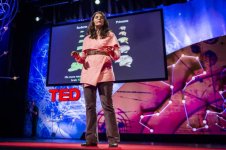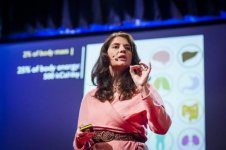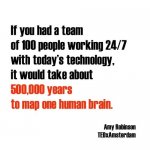David Baxter PhD
Late Founder
Suzana Herculano-Houzel: What is so special about the human brain?
TED Talks
June 2013
The human brain is puzzling -- it is curiously large given the size of our bodies, uses a tremendous amount of energy for its weight and has a bizarrely dense cerebral cortex. But: why? Neuroscientist Suzana Herculano-Houzel puts on her detective's cap and leads us through this mystery. By making "brain soup," she arrives at a startling conclusion.
Suzana Herculano-Houzel shrunk the human brain by 14 billion neurons -- by developing a new way to count them.
How many neurons make a human brain? For years, the answer has been (give or take) 100 billion. But neuroscientist Suzana Herculano-Houzel decided to count them herself. Her research approach involved dissolving four human brains (donated to science) into a homogeneous mixture -- in her lab at the Institute of Biomedical Sciences in Rio de Janeiro, they call it "brain soup." She then took a sample of the mix, counted the number of cell nuclei belonging to neurons, and scaled that up. Result: the human brain has about 86 billion neurons, 14 billion fewer than assumed -- but intriguingly, far more than other animals, relative to brain size.
She suggests that it was the invention of cooking by our ancestors -- which makes food yield much more metabolic energy -- that allowed humans to develop the largest primate brain. She's now working on elephant and whale brains to test her hypothesis.
TED Talks
June 2013
The human brain is puzzling -- it is curiously large given the size of our bodies, uses a tremendous amount of energy for its weight and has a bizarrely dense cerebral cortex. But: why? Neuroscientist Suzana Herculano-Houzel puts on her detective's cap and leads us through this mystery. By making "brain soup," she arrives at a startling conclusion.
Suzana Herculano-Houzel shrunk the human brain by 14 billion neurons -- by developing a new way to count them.
How many neurons make a human brain? For years, the answer has been (give or take) 100 billion. But neuroscientist Suzana Herculano-Houzel decided to count them herself. Her research approach involved dissolving four human brains (donated to science) into a homogeneous mixture -- in her lab at the Institute of Biomedical Sciences in Rio de Janeiro, they call it "brain soup." She then took a sample of the mix, counted the number of cell nuclei belonging to neurons, and scaled that up. Result: the human brain has about 86 billion neurons, 14 billion fewer than assumed -- but intriguingly, far more than other animals, relative to brain size.
She suggests that it was the invention of cooking by our ancestors -- which makes food yield much more metabolic energy -- that allowed humans to develop the largest primate brain. She's now working on elephant and whale brains to test her hypothesis.



